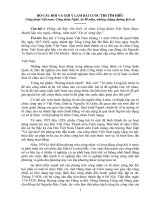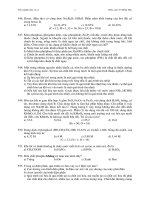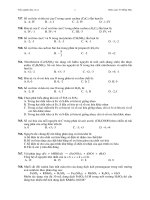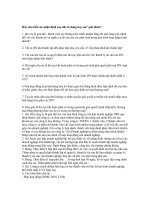ĐÁP ÁN CÂU HỎI TIẾNG ANH PHẦN ĐIỀN TỪ. THI CÔNG CHỨC QUẢNG NAM
Bạn đang xem bản rút gọn của tài liệu. Xem và tải ngay bản đầy đủ của tài liệu tại đây (120.72 KB, 13 trang )
NGÂN HÀNG CÂU HỎI TIẾNG ANH THI CÔNG CHỨC TỈNH QUẢNG NAM
(PHẦN ĐIỀN TỪ)
C1. We’ve just come back exhausted after a two-week holiday in France. We were
really exhausted. On the last day, we drove non-stop from Marseille to Calais –we
should have (1) broken our journey in Lyon or Paris. As if that wasn’t enough, the
sea was so rough in the English Channel that the (2) expedition took three hours
instead of one and a half. Next year, we plan to book a cheap (3) overall holiday to
Italy. It sounds marvellous — the cost of the flight, the hotel and all our meals are
(4) includedin the price. While we’re in Rome, we’ll be going on a guided (5) tour
to Coliseum. The last time I was (6) in Italy, I was in a business (7) trip. I couldn’t
see many of the famous tourist (8) sights on that occasion, but my wife was really
interested (9) in Italy. We have work hard these years to save money for the next
trips in the (10) next years.
C2. According (1) to computer models that were used to estimate the running
speeds of dinosaurs, the Tyrannosaurus Rex would have been able to outrun a
footballer. The study shows that the dinosaur could reach a top (2) speed of 8
metres a second, which is (3) fractionally faster than the average professional
footballer. There has been a lot of controversy (4) about whether the
Tyrannosaurus Rex was a predator or a scavenger; some believe that its highly
developed sense of smell indicates that it was a scavenger, (5) while others say that
its keen eyesight shows that it was a hunter. The (6) latter group will appreciate the
recent study, as a hunter is more (7) likely to require such speed. The University of
Manchester study used a powerful supercomputer to calculate the running speeds of
five meat-eating dinosaurs and used data taken (8) directly from dinosaur fossils,
(9) rather than referring to previous work on (10) modern animals.
C3. In 1993, Greg Mortenson took a (1) Trip to Pakistan to climb K2, the second
tallest mountain in the world. On his way down the mountain, he got lost. Food and
water were (2) Hard, but Mr. Mortenson found a small village. The people there
saw that he was (3) Need and helped him. While in the village, Mr. Mortenson
watched the children write in the dirt for their school lessons. The village did not
have money to build a school or (4) Pay for a teacher. Before he left, Mr.
Mortenson (5) Volunteered to return to the village and help them build a school.
Mr. Mortenson returned to the US and wrote to many (6) Rich people. That idea
did not work very well, but (7) At last enough people heard about Mr. Mortenson's
plan and helped him. That was the beginning of the Central Asia Institute, an
organization that has (8) Succeeded in building or helping to build more than 130
schools in small villages in Pakistan and Afghanistan. With the help of (9)
Journalist David Relin, Mr. Mortenson wrote the famous book Three Cups of Tea.
Some people have criticized him, however, Mr. Mortenson was given an (10) Prize
in 2009 by the government of Pakistan for his work in that country.
C4. Beijing is the capital city of the People’s Federal Republic of China. “Beijing”
comes from the Chinese words “northern” and “capital” and follows a(n) (1)
ancient East Asian tradition of naming capital cities literally. Other similarly
named cities (2) include Nanjing in Southern China which means “southern
capital”, and Tokyo in Japan, which means “eastern capital”. Beijing is the political
and cultural (3) centre of China and is world-famous for its many historical
attractions. Four million people visit Beijing each year to see (4) sights such as the
magnificent Forbidden City, Tiananmen Square and The Great Wall of China. It is
also one of the world’s great modem metropolises and is (5) full of 21st century
vitality. Towering skyscrapers, huge shopping malls, and modem commercial areas
are just as much a (6) part of modern-day Beijing. In 2001, Beijing celebrated the
news that it had been selected to (7) host the 2008 Summer Olympics. Hundreds of
thousands of flag-waving Chinese poured into Beijing’s streets, singing and
2
cheering. Fireworks (8) glowed up the sky as the city rejoiced. The morning after
the (9) announcement, the titles of all Beijing’s newspapers were printed in red —
a special colour in Chinese (10) tradition that is reserved for good and important
news.
C5. Most people think that the capital of the (1) movie world is Hollyhood, in the
(2) United States. However, the real movie capital is Mumbai, in (3) India.
Mumbai used to be known as Bombay, and so the film industry there is called
“Bollywood.” Bollywood makes twice as many movies each year as Hollyhood—
more than 800 films a year.
The (4) movies from Bollywood are very different from Hollywood movies. For
one thing, Bollywood movies are much (5) longer than most Hollywood movies.
Most Bollywood movies are more than three hours long, and contain singing,
dancing, action, adventure, mystery, and romance (but usually no kissing). Because
Bollywood films contain so many different features, this (6) style of film is
sometimes called a “masala” film. (“Masala” is an Indian word for a mixture of
spices.)
Another big (7) difference between Bollywood and Hollywood movies is the way
movies are made. It takes much longer to make a movie in Hollywood than in
Bollywood. (8) In fact, filming may begin on a Bollywood movie before the script
even finished. The director and writers can make (9) up the story while the film is
being made. Sometimes they will even write the script by hand instead (10) of
taking time to type it.
3
C6. There is an old English (1) Saying, “Laughter is the best medicine”. One
person who certainly would have agreed with this is Norman Cousins. Norman
Cousins the editor of a magazine called Saturday Review for almost forty years. He
also wrote and (2) Spoke about world peace and anti-nuclear and anti-war issues,
traveling (3) To many different countries to share his ideas. In the 1960s, after
returning to the United States from a busy and tiring trip to Europe, Mr. Cousins
got sick. He discovered he had a rare disease known as that caused the joints
between his bones to (4) become stiff. In less than a week after he got (5) Back, he
could not stand. Every move that he (6) Made was painful. He was not able to
sleep at night. The doctors told Mr. Cousins that they did not (7) Know how to cure
his problem and he might never get over the illness. Mr. Cousins, however, refused
to give (8) Up hope. Mr. Cousins thought that the illness could be caused (9) By
unhappy thoughts. He did not want to (10) Take medicine to cure himself. Instead,
he felt that happy thoughts or laughter might cure his illness.
C7. Human memory, formerly believed to be rather inefficient, (1) is really much
more sophisticated than that of a computer. Researchers approaching the problem
from a variety of (2) Points of view have all concluded that there is a great deal
more stored in our minds than has been generally supposed. Dr. Wilder Penfield, a
Canadian neurosurgeon, proved that by stimulating (3) Their brains electrically, he
could elicit the total recall of complex events in his subjects’ lives. Even dreams
and other minor events supposedly forgotten (4) For many years suddenly emerged
in detail. The memory trace is the term for (5) Whatever forms the internal
representation of the specific information about the event stored in the memory.
Assumed to have been made by structural changes in (6) The brain, the memory
trace is not subject to direct observation but is rather a theoretical construct that is
used to speculate about how information presented at a particular time can cause
performance at a later time. Most theories include the (7) Strength of the memory
trace as a variable in the degree of learning, retention, and retrieval possible for a
4
memory. One theory is that the fantastic capacity for storage in the brain is the
result (8) Of an almost unlimited combination of interconnections between brain
cells, stimulated by patterns of (9) Activity. Repeated references to the same
information support recall. Or, to say that another way, improved performance is
the result of (10) Strengthening the chemical bonds in the memory.
C8. Psychologists generally (1)_____memory into (2)_____least two types, shortterm and long-term memory, which combine (3)_____form working memory.
Short-term memory contains what we are actively (4)_____on at any particular
time, but items are not retained longer (5)_____twenty or thirty seconds without
verbal rehearsal. We use short-term (6)_____when we look up a telephone number
and repeat it to ourselves until we can place the call. On the other (7) _____, longterm memory can store facts, concepts, and experiences after we stop thinking
(8)_____them. All conscious (9)_____of information, as in problem solving for
example, involves both short-term and long-term memory. As we repeat, rehearse,
and recycle information, the memory trace is strengthened, allowing that
information to move (10)_____ short-term memory to long-term memory.
C9. I have (1) Returned to my hometown of Wilson Creek after an absence of 10
years. So many things have changed around here. When I left Wilson Creek, there
(2) Was a small pond on the right as you left town. They have filled in this pond
and they have built a large shopping mall (3) There. A new post office has also
been built just across from my old school. There is a baseball (4) Stadium on the
outskirts of Wilson Creek which has been changed (5) Completely. They have now
added a new stand where probably a few thousand people could sit. It looks really
great. The biggest changes have taken place (6) Place the downtown area. They
have pedestrianised the centre and you can't drive there anymore. A European-style
fountain has been (7) Built and (8) Some benches have also been added along with
a grassy area and a new street cafe. My street looks just the same as it always has
5
but a public library has been built in the next street along. There (9) Used to be a
great park there but they have cut down all the trees which is a pity. The library
now has a large green area in front (10) Of it but it's not the same as when the park
was there.
C10. Philology (1)_____the traditional study of language, especially of written
languages in their cultural settings. Because philology (2)_____with the
relationship of languages, it is usually comparative; because these relationships
evolve (3)_____time, it is typically historical. Languages (4)_____ to change in the
direction of greater diversity; one language tends to be superseded by several: a
(5)_____“dead” language preserves evidence of the earlier forms from which
“living” languages developed. The descendants of Latin have diverged to the point
that, though Italian is related (6)_____English, they are now foreign to each other
as is their common “parent” to both. Also cultures change the meaning and use of
many words. In English, piano is a keyboard (7)_____; in Italian piano not only
names the instrument, it also means “soft” as opposed to “loud”. The original name
for the instrument was pianoforte (soft-loud), because it was more (8) _____of
varying sound volume than instruments like the harpsichord that came before it.
The special meaning of the Italian phrase results from its (9)_____context and the
distinctive feature of the instrument it names. But in English and other languages,
we abbreviate it to piano. The English word still (10)_____the same instrument but
the abbreviation discards “and loud" from the original Italian phrase and hence
becomes a name and not a description.
6
C11. Edward Patrick Eagan was (1) born April 26, 1897, in Denver, Colorado, and
his father died in a railroad accident when Eagan was only a year old. He and his
four brothers (2) were raised by his mother, who earned a small income from
teaching foreign languages. Inspired (3) by Frank Merriwell, the hero of a series of
popular novels for boys, Eagan pursued an education for himself as well as an
interest (4) in boxing. He (5) attended the University of Denver for a year before
serving in the U.S. Army as an artillery lieutenant during World War I. After the
war, he entered Yale University and, while studying there, won the U.S. national
amateur heavyweight boxing title. He graduated from Yale in 1921, attended
Harvard Law School, and received a Rhodes scholarship to the University of
Oxford (6) where he received his A.M. in 1928. While studying at Oxford, Eagan
became (7) the first American to win the British amateur boxing championship.
Eagan won his first Olympic gold medal as a light heavyweight boxer (8) at the
1920 Olympic Games in Antwerp, Belgium. Eagan also fought at the 1924
Olympics in Paris as a heavyweight but failed to get a medal. Though he had (9)
taken up the sport just three weeks before the competition, he managed to win a
second gold medal as a member of the four-man bobsled team at the 1932
Olympics in Lake Placid, New York. Thus he became the only athlete to (10) win
gold medals at both the Summer and Winter Olympics.
C12. Vitamins, taken in tiny doses, (1) are a major group of organic compounds
that regulate the mechanisms by which the body converts food (2) into energy.
They should not be confused (3) with minerals, which are inorganic in their
makeup. Although in general the naming of vitamins followed the alphabetical
order of their (4) identification, the nomenclature of individual substances may
appear to be somewhat random and disorganized.
7
Among the 13 vitamins (5) known today, five are produced in the body. Because
the body produces (6) sufficient quantities of some but not all vitamins, they must
be supplemented in the daily diet.
(7) Although each vitamin has its specific designation and cannot be replaced by
another compound, a lack of one vitamin can interfere with the processing of (8)
another.
When a lack of even one vitamin in a diet is continual, a vitamin deficiency may
(9) result.
The best way for an individual to ensure a necessary supply of vitamins is to
maintain a balanced diet that includes a variety of foods and provides adequate
quantities of all the compounds.
Some people take vitamin supplements, predominantly in the (10) form of tablets.
C13. What has caused these major changes? One reason (1) is economic necessity.
It may be that the husband has (2) lost his job and the wife must support the family.
Or even if the husband is working, some families say they can’t survive on only (3)
one paycheck.
But probably a (4) more important influence has been the “women’s
liberation movement.” Women are being told in (5) many magazines and TV
programs: “You can be successful on your own. Don’t be satisfied with (6) just
being a wife and mother. Use your intelligence and talents to do something bigger.
And you should be paid (7) as much as a man.”
(8) No doubt this movement has accomplished much good. But it has also
contributed to a selfish “me first” attitude that is breaking up many families.
Sometimes women (9) who are happy staying at home feel that working women
look (10) down on them.
8
There are no easy answers to these problems. But certainly women’s
influence will continue to grow in business, education and politics.
C14. Leisure is generally seen as an (1) event which takes place outside (2)
working hours. The peak leisure time for most people is between 6.00 pm and
12.00 am, although in recent years there has been an increase in people working (3)
unreasonable hours and shifts, together with more "flexitime". Leisure is often
thought of purely as a (4) physical activity, i.e. playing sport. Although many
people use their (5)
free time in this way, there are plenty of other leisure
opportunities that are more (6) passive in nature, such as of one's life- watching
television or sunbathing on a beach. It is important to realise that leisure can
embrace a whole range of experiences and activities, although personal choice may
be limited due to factors such as age or provision of local (7)_____. The leisure
emphasis will normally change at different (8) levels cycle. Different types of
leisure (9) age tend to be popular with varying age groups. It's probably true,
however, that some members of the older (10)______are more capable of pursuing
active pastimes than they are sometimes given credit for.
Question 1: A. event
B. incident
C. affair
Question 2: A. labor
B. working
Question 3: A. unsocial B. unreasonable
C. employment
C. unsociable
Question 4: A. cultural B. physical
Question 5: A. rest
B. unoccupied
Question 6: A. passive B. selective
Question 7: A. conveniences B. capabilities
C. social
C. free
C. productive
C. capacities
9
D.
experience
D. job
D.
unsuitable
D. mental
D. empty
D. creative
D. facilities
Question 8: A. parts
Question 9: A. period
B. stages
B. era
C. sections
C. age
Question 10: A. entertainments B. occupationsC. pastimes
D. levels
D.
generation
D. games
C15. Our journey to Greece began at six in the morning, when my family and I set
off from the house in our old car. We'd only gone a mile when we got a (1) broken
tyre, and after we'd fixed that we had to hurry to the airport. We (2) could to reach
the check-in just before it closed, then went through to the departure lounge. Soon
we were (3) flying the plane, and looking forward to our week on an island in the
sun. I had a window seat, but since I was directly above the (4) wing I couldn't see
much, so I asked the flight (5) attendant if I could move to another seat. She found
me one nearer the front of the plane, and later on I had a wonderful (6) view of the
snow-covered mountains as we crossed over the Austrian Alps. The weather
became sunnier as we approached Greece, and our plane arrived right on (7) time
at Athens' very smart new airport. Half an hour after we landed, we (8) go into the
train for the centre of Athens, where we (9) replaced trains for the port of Piraeus.
It wasn't long before we were on the waterfront. After a short wait we were on
board our ferry and sailing out to sea. It was a lovely trip, and when finally we
reached our destination, the holiday was a (10) hope come true.
C16. Right now, I am (1) looking at a shelf full of relics, a collection of has-beens,
old-timers, antiques, fossils. Right now I am looking at a shelf full of books. Yes,
that's right. If you have some spare cash (the going rate is about $89) and (2) are
looking to enhance your reading experience, then I highly suggest you
10
consider (3) purchasing an e-reader. E-readers are replacing the books of old, and I
welcome them with open (4) arms (as you should). If you haven't heard of an ereader and (5) don't know what it is, then please permit the following explanation.
An e-reader is a device (6) that allows you to read e-books. An e-book is a booklength publication in digital (7) form, consisting of text, images, or both, and
produced on, published through, and readable on computers or other electronic
devices. Sometimes the equivalent of a conventional (8) printed book, e-books can
also be born digital. The Oxford Dictionary of English defines the e-book as "an
electronic version of a printed book," but e-books can and do exist without any
printed equivalent. So now you know what an e-reader is. But you still may be
wondering why they put printed books to shame. E-readers are superior to printed
books because they (9) save space, are (10) environmentally friendly, and provide
helpful reading tips and tools that printed books do not.
C17. Many of us are trying to think of new (1) approaches to help the
environment. Groups which are involved in protecting the environment think they
may have found a long-term (2) solution. Most of the current ways of getting
people involved in helping the environment mean that people have to (3) Join a
large organisation and they can sometimes feel the problem is too large or (4)
Impossible to manage. A new (5) Aware is that groups are set up locally to deal
with small issues that affect just the community they (6) To in. It is hoped this will
make people more (7) Hoping of the importance of helping. Also, this plan means
that each community works together by contributing (8) Financial the environment
and this makes for a strong community. If every community does this then
organisers are (9) Reducing the effect will be national. The government may even
offer some (10) Pleasure help for projects set up by these local groups. The idea
came from someone who thought that reducing the size of what we do would
actually be more productive. Also, it should mean that helping becomes a pleasure
rather than a chore.
11
C18. E-readers are superior (1) to printed books because they save space. The
average e-reader can store thousands of digital books, (2) providing a veritable
library at your fingertips. What is more, being the size and weight of a thin
hardback, the e-reader (3) itself is relatively petite. It is easy to hold and can fit in a
pocketbook or briefcase easily. This makes handling ponderous behemoths such as
War and Peace, Anna Karenina, and Les Misérables a breeze. Perhaps the only
drawback to the space-saving aspect of an e-reader is that it requires you to find
new things to put on your shelves. In addition, e-readers are superior to books
because they are environmentally friendly. The average novel is about 300 pages
(4) long. So, if a novel is printed 1000 times, it will use 300,000 pieces of paper.
That's a lot of paper! If there are about 80,000 pieces of paper in a tree, this means
it (5) takes almost 4 trees to make these 1000 books. Now, we know that the
average bestseller sells about 20,000 copies per week. That means that it takes over
300 trees each month to sustain this rate. And for the super (6) bestsellers, these
figures increase dramatically. For example, the Harry Potter book series has sold
over 450 million copies. That's about 2 million trees! Upon viewing these (7)
figures, it is not hard to grasp the (8) severe impact of printed books on the
environment. Since e-readers use no trees, (9) they represent a significant amount
of preservation in terms (10) of the environment and its resources
C19. The latest blockbuster to hit our cinemas is an adventure film which was made
(1) on location in Spain. The (2) plot is quite simple; a teenager discovers (3) some
secret papers which show that the President is in danger. Then she disappears! We
interviewed the actress who (4) plays the part of the teenager in the film, Juliet
12
Roberts. It (5) seems things did not always go well during the production. First,
Juliet nearly missed being in the film. Apparently, a copy of the (6) script, which
the producer had sent her to read, got lost in the post. Then, in the middle of
filming, part of the background (7) scenery fell on a member of the camera (8)
crew. Luckily, the man was not seriously hurt but they had to (9) hire another
cameraman to take his place at short notice. Something even worse happened a few
days later when the director slipped and broke his leg. It (10) took him quite a long
time to recover from the shock and he had to direct the final scenes of the film from
his wheelchair.
C20. Mona (1) doesn’t like to ask people for help. But it is hard (2) for her to
perform daily activities on her own. She is almost 13, yet she is no larger than a 5year-old. Mona has trouble (3) keeping her balance and can’t walk very far. When
she uses a wheelchair, she can’t push it (4) herself.
Fortunately, Mona has a
wonderful service dog (5) named Sam. A service dog is a dog that has been trained
to assist someone who has a physical problem. Sam (6) lets Mona lean on him
when she walks. He (7) also pulls her wheelchair and turns lights on and off. When
Mona drops something, Sam picks it up. He even pulls her socks off at night.
Sam also helps Mona with everyday tasks at school. He carries her books from
class to class in a special backpack. He puts Mona’s completed assignments in her
teachers’ homework trays. In the lunchroom he throws away her trash.
(8) Besides making Mona less dependent on other people, Sam helps her
lead a fuller life. Mona’s classmates flock around Sam like geese. This has helped
her (9) make friends. Sam also helps Mona be more active. With his aid, she raised
over $500 in a walk-a-thon for her local humane society.
Because of Sam, Mona doesn’t have to ask people for help. Sam brings her
closer to other kids. And he even helps her (10) contribute to her community.
13









